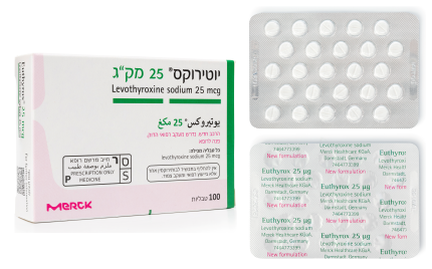Quest for the right Drug

יוטירוקס 25 מק"ג EUTHYROX 25 MCG (LEVOTHYROXINE AS SODIUM, LEVOTHYROXINE SODIUM)
תרופה במרשם
תרופה בסל
נרקוטיקה
ציטוטוקסיקה
צורת מתן:
פומי : PER OS
צורת מינון:
טבליה : TABLETS
עלון לרופא
מינוניםPosology התוויות
Indications תופעות לוואי
Adverse reactions התוויות נגד
Contraindications אינטראקציות
Interactions מינון יתר
Overdose הריון/הנקה
Pregnancy & Lactation אוכלוסיות מיוחדות
Special populations תכונות פרמקולוגיות
Pharmacological properties מידע רוקחי
Pharmaceutical particulars אזהרת שימוש
Special Warning עלון לרופא
Physicians Leaflet
Special Warning : אזהרת שימוש
4.4 Special warnings and precautions for use Before starting therapy with thyroid hormones or before performing a thyroid suppression test, the following diseases or medical conditions should be excluded or treated: coronary failure, angina pectoris, arteriosclerosis, hypertension, pituitary insufficiency. Thyroid autonomy should also be excluded or treated before starting therapy with thyroid hormones. In case of adrenocortical dysfunction, this should be treated before starting the therapy with levothyroxine by adequate replacement treatment to prevent acute adrenal insufficiency (see section 4.3). When initiating levothyroxine therapy in patients at risk of psychotic disorders, it is recommended to start at a low levothyroxine dose and to slowly increase the dosage at the beginning of the therapy. Monitoring of the patient is advised. If signs of psychotic disorders occur, adjustment of the dose of levothyroxine should be considered. Even slight drug-induced hyperthyroidism must be avoided in patients with coronary failure, cardiac insufficiency or tachycardiac arrhythmias. Hence frequent checks of thyroid hormone parameters must be made in these cases. In the case of secondary hypothyroidism the cause must be determined before replacement therapy is given and if necessary replacement treatment of a compensated adrenal insufficiency must be commenced. Where thyroid autonomy is suspected a TRH test should be carried out or a suppression scintigram obtained before treatment. Haemodynamic parameters should be monitored when levothyroxine therapy is initiated in very low birth weight preterm neonates as circulatory collapse may occur due to the immature adrenal function. In postmenopausal women with hypothyroidism and an increased risk of osteoporosis supra-physiological serum levels of levothyroxine should be avoided, and, therefore, thyroid function should be checked closely. Levothyroxine should not be given in hyperthyreotic states other than as concomitant supplementation during anti-thyroid drug treatment of hyperthyroidism. Thyroid hormones should not be given for weight reduction. In euthyroid patients, treatment with levothyroxine does not cause weight reduction. Substantial doses may cause serious or even life- threatening undesirable effects. Levothyroxine in high doses should not be combined with certain substances for weight reduction, i.e. sympathomimetics (see section 4.9). Hypothyroidism and / or reduced control of hypothyroidism may occur when orlistat and levothyroxine are co-administered (see section 4.5). Patients taking levothyroxine should be advised to consult a doctor before starting or stopping or changing treatment with orlistat, as orlistat and levothyroxine may need to be taken at different times and the dose of levothyroxine may need to be adjusted. Further, it is recommended to monitor the patient by checking the hormone levels in the serum. For diabetic patients and patients under anticoagulant therapy, see section 4.5. Interferences with laboratory test: Biotin may interfere with thyroid immunoassays that are based on a biotin/streptavidin interaction, leading to either falsely decreased or falsely increased test results. The risk of interference increases with higher doses of biotin. When interpreting results of laboratory tests, possible biotin interference has to be taken into consideration, especially if a lack of coherence with the clinical presentation is observed. For patients taking biotin-containing products, laboratory personnel should be informed when a thyroid function test is requested. Alternative tests not susceptible to biotin interference should be used, if available (see section 4.5). This medicinal product contains less than 1 mmol sodium (23 mg) per tablet, i.e. essentially ‘sodium-free’. In order to ensure the continuity of different products of levothyroxine sodium in individual patients it should be emphasized that if patients are changed from one levothyroxine sodium product to another it should be done only with specific counseling and tight monitoring from their healthcare professional. In some patients, a dose adjustment could be necessary.
Effects on Driving
4.7 Effects on ability to drive and use machines No studies on the effects on the ability to drive and use machines have been performed. However, since levothyroxine is identical to the naturally occurring thyroid hormone, it is not expected that Euthyrox has any influence on the ability to drive and use machines.

שימוש לפי פנקס קופ''ח כללית 1994
Thyroid deficiency states
תאריך הכללה מקורי בסל
01/01/1995
הגבלות
תרופה שאושרה לשימוש כללי בקופ'ח
מידע נוסף
